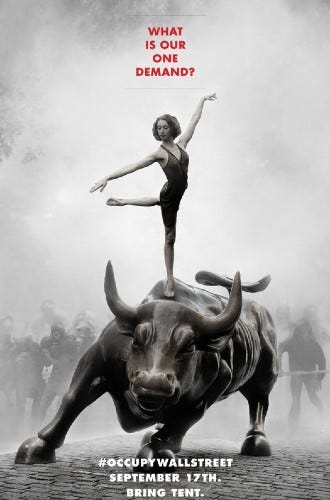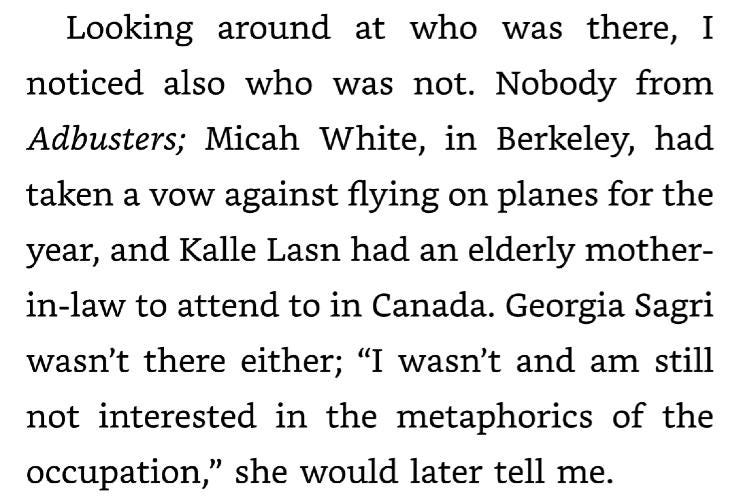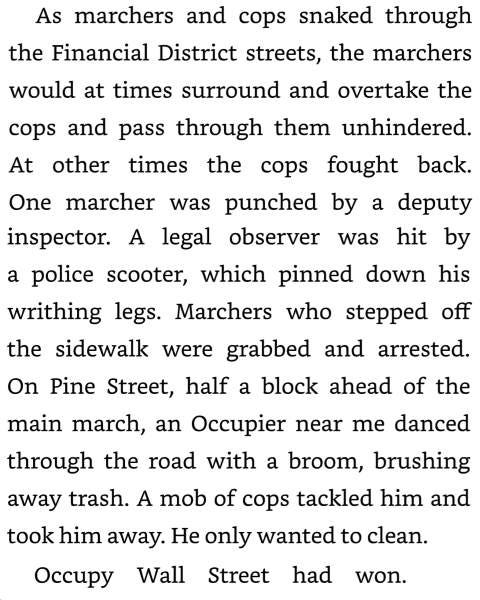Though it’s being memorialized almost nowhere, today marks the ten-year anniversary of Occupy Wall Street. I want to talk about it for two reasons. First, enough time has passed that I think I can look at it dispassionately and analytically. I’m old enough to know that if I feel very strongly about something — if an issue raises my blood pressure and makes me pound my fist and POST COMMENTS ON MESSAGE BOARDS THAT USE EVERY MODE OF EMPHASIS AVAILABLE TO ME!!! — if I just wait a few years, I probably won’t give a fraction of a shit.
The second reason is that I’m fascinated by the relationship between liberals and leftists. I’ve basically written off the American right; all the interesting debates are happening on the left. The left is experiencing an often-discussed fissure on social issues and a rarely-discussed fusion on economic issues (anyone catch Jon Chait sticking up for AOC? Seems indicative of something). Occupy Wall Street was a liberals-are-from-Mars, leftists-are-from-Venus moment; that’s what I thought at the time, and researching the history of the movement has multiplied that feeling by a million. There really should be an Odd Couple-style sitcom where a liberal and a leftist share an apartment, except I guess there can’t be, because no leftist would live in a corporate-owned urban high-rise, and no liberal would live in a 16-person “collective” that’s really just a bunch of tents around an old school bus.
Occupy Wall Street was one of the first hashtag movements. It started with this poster, which was posted by a left-leaning group called Adbusters:
Occupy Wall Street was a bit Fyre Festival-esque in its origins, in that a group (Adbusters) basically came up with a dope-ass promotional campaign and figured they’d decide what they were promoting later. That, at least, is the general story told in two books by people involved in the movement: Translating Anarchy by Mark Bray and Thank You, Anarchy by Nathan Schneider. Both books have anarchist sympathies and both — in a pure bit of Dadaist irony — are available for sale on Amazon.
Incredibly, the Adbusters people — the folks who made the poster and started the hashtag — were mostly out of the picture by September 17. Here’s an account of the first day of protest, from Thank You, Anarchy:
I have to say: That just fucking rules. To start a campaign — to build interest in what’s ostensibly a grassroots, Arab spring-style movement for lasting change (“BRING TENT”) — and then go “oh actually I have a thing that day”…that’s just balls-out, above-it-all coolness of the highest order. I mean, if Gandhi had organized the Salt March, and everyone showed up in their home-spun clothes ready to risk bodily harm to resist colonialism, and then Gandhi himself has skipped out because he had Major Lazer tickets…that’s probably the only thing Gandhi could have done that would make me respect him more.
Thank You, Anarchy reveals that Adbusters was marginalized almost immediately. The pre-September 17 meetings quickly came to be dominated by on-the-ground organizers, who immediately began doing what leftists do best: Splitting into factions. The anarchists split with the Marxists, and the labor Marxists feuded with the philosophical Marxists, and distinctions were drawn between “libertarian” and “anti-hierarchical”…all classic stuff. We still don’t know if matter can be split into infinite parts, but we know that the political left can be split into infinite parts. It actually might be the thing they do best.
The one thing basically everyone seemed to agree on almost immediately was that the “one demand” angle did not particularly interest them. The core group of organizers who encamped in Zuccotti Park on September 17 had mostly jettisoned the “one demand” idea. This became a major source of confusion for people outside the movement: Wasn’t the whole point to focus political pressure on one, discrete idea? The “one demand” concept — and the fact that OWS never did produce that one demand — caused many interested watchers to view OWS with intrigue, then frustration, and to ultimately dismiss it as unserious.
For the most part, that’s the liberal role in this story: Outside observers who didn’t know whether or how to engage. Liberals have a complicated relationship with leftists, and especially leftist protest movements. Liberals consider ourselves aligned with past protest movements; our heroes include the civil rights protesters of the ‘60s, the suffragettes, and various other non-violent leaders (did you notice how I kissed Gandhi’s ass earlier?). So, when we see a protest movement — especially one that’s about the downward distribution of resources, which is very much part of our program — our instincts are sympathetic. We consider them to be fellow travelers. What we often fail to realize is: Leftists fucking hate us.
Most leftists HATE liberals. They see us as disingenuous sell-outs. Please remember: I just read two books by leftists. Liberals get a portrayal in those two books that I would describe as “substantially less sympathetic than the portrayal the velociraptors get in Jurassic Park.” The authors treat Wall Street as an almost tertiary villain; liberals are the real enemy. I started to wonder why the movement didn’t invade a Panera Bread and call itself Occupy Bougie Liberal Hang-Out Spots. But this is the liberal/left dynamic: One side thinks the two parties share a deeply-felt bond, the other side hates the first side with the power of a billion suns. It’s the same relationship I have with my cat.
That reality makes the liberal response to Occupy Wall Street seem pretty fucking clownish in retrospect. Obama, Pelosi, and Jon Stewart — the holy trinity of liberal opinion-making at the time — expressed sympathies. There was a definite sense of “can we capture this energy and put it to use?” Some wondered if OWS could be “a Tea Party for the left”, a phrasing I hated, because to me, the defining feature of the Tea Party is that they’re a bunch of reactionary, batshit morons. So, if the sales pitch is “reactionary, batshit morons for the left”, I’m opting out of that.
People with sympathy for the movement’s (difficult to pin down) goals tried to provide strategic advice. In a New York Times op-ed, James Miller1 discussed the inherent limits of OWS-style direct democracy, and Marty Linsky made a similar point for CNN. These points seem, to me, to be beyond obvious; OWS was beset by procedural problems. In early meetings, anyone could veto anything, though that was eventually changed to a still-not-practical 90 percent “modified consensus”. During a speech, people who wanted to express approval for what was being said were asked to “twinkle” — wiggle their fingers in the air — and I’ll tell you: The moment I heard about twinkling was the moment I thought: “I will not go to Zuccotti Park.” Meetings — which, according to Schneider, could “stretch over many days” — typically utilized the “people’s microphone”, a call-and-response method of amplifying the speaker’s words. Watch this clip, and if you get through the entire 1:02 and still think “that seems practical”, I will Venmo you a million dollars.
Incredibly, there’s a story in Thank You, Anarchy of a woman with experience in the revered-by-the-protesters 15-M Movement saying that the people’s mic would “get old before long and need to be replaced.” I don’t know why her opinion was ignored. Aid from sympathetic groups was similarly pushed away; OWS had prickly relationships with unions, and in Thank You, Anarchy, MoveOn.org — which sent large numbers of people to rallies — is denounced as a “progressive establishmentarian co-opter” (leftists hate us). Both books make it clear that the advice from Miller, Linsky, and others was not well-received; responding to Linsky, Translating Anarchy author Mark Bray writes:
“We weren’t outliers, we were the potential outcomes.” “We weren’t outliers, we were the potential outcomes.” I’ve read that 20 times and I don’t know what it means.
Or…do I?
…
No. No I don’t.
But…don’t I? Okay, fuck it, yes — let’s go with “yes” for the sake of argument. Here’s what I’m getting from all this: Liberals — who mostly watched from the outside — and the leftists who actually were the movement had very different ideas of what Occupy Wall Street was meant to be.
For liberals, it was all about outcomes. Could OWS rally support for a concrete, discernable change, possibly the elusive “one demand”? When the answer started to look like “no” — which might have happened around the time OWS Boston issued a list of demands that included “no one’s human needs go unmet” — liberals lost interest. I don’t think that’s to our discredit; I think a concerted focus on outcomes is a feature of liberalism, not a bug. Make things better or fuck off — if that’s our motto, I’m fine with that.
But for the people in the movement — based on what I’ve read — Occupy Wall Street seems to have been more of a social phenomenon than a political one. They wanted to occupy part of the Financial District, and they occupied part of the Financial District. Success. They had marches and meetings and lived together and pooped in the same McDonald’s in an experience that none of them will ever forget. Listen to how Thank You, Anarchy author Nathan Schneider describes an October 14 rally, which he describes as the “apotheosis of Occupy Wall Street”:
“Occupy Wall Street had won.” It reminds me of an old cliché-slash-Aerosmith lyric: “It’s about the journey, not the destination”. Like most clichés — and to a lesser extent most Aerosmith lyrics — there’s some truth to it. It certainly seems to be true to Schneider. For him, OWS was about protesting, not the outcome of the protest.
That isn’t true for all protesters, but it’s true for some. Some people have a need for expression and rebellion that I totally understand. I get how being steamrolled by a police scooter (they have scooters?) could be strangely life-affirming. For our part, liberals should drop our dismay when some BLM protesters do things that seem counter-productive, or when the Sunrise Movement adopts tactics that are indistinguishable from a James Lindsay prank. On the other side of the coin, every protester might do well to eventually ask themselves: “What am I doing here?” Some will decide they’re in it for the McDonald’s-pooping and scooter-induced injuries, and to them I say: God speed. But the ones who decide they’re more about outcomes might maybe, possibly, theoretically, in some universe want to consider taking advice from admittedly-annoying progressives and liberals. Because — though I know this will ring hollow coming from a neoliberal shill like myself — maybe we’re actually just trying to help.
***Poll***
For Tuesday, I plan to write up the thing (which won the poll last week) about how the progressive narrative around gentrification is anti-progressive. So, here’s another general question, and, so everyone knows: The point of these polls is to figure out how IMBW should evolve. It’s still 100% free, so now’s the time to experiment and see what works, and I’m trying to figure out what people want.
And thanks very much for voting in these! They’re useful.
If there was an audio version of I Might Be Wrong (in addition to the written version), I would think...
1. I would DEFINITELY use that! Reading sucks. [VOTE FOR THIS]
2. Reading sucks but I'd still prefer the written version -- it's just what I'm used to. [VOTE FOR THIS]
In context, it might seem that I’m calling Miller and Linsky “liberal”; I don’t actually know how either identifies, politically. The relevant point here is that both expressed sympathies for OWS in their articles.










I mean, whatever else it was OWS was a class-first framing - the 99% was the 99% of the income distribution. Now progressives have a class-never framing and think talking about class issues is inherently racist. So, yeah, not great.
Hey, Jeff. I'm a big fan of your writing, thanks for sharing your work. To the extent you're willing to take advice from randos in your comment section, I have one request for you: it's ok to be funny and smart, don't back down into the "I'm just a sarcastic joke-maker" when your ideas challenged. Your analysis is high quality and incisive and your jokes are engaging. Some other people I find smart and funny are too quick to retreat into "I'm just a clown, not a real news person" when they get it wrong. Joe Rogan and maybe John Stewart fall into this camp. If your ideas are correct, stand by them; if your ideas are wrong, fix them, but don't try to laugh it all away.
I'm offering this advice not because I've seen you indulge in this behavior, but because my view of the world is largely similar to yours and you seem like an especially talented advocate for moving society in a positive direction. P.S I loved your podcast with Andrew Heaton, who I also find smart and funny.